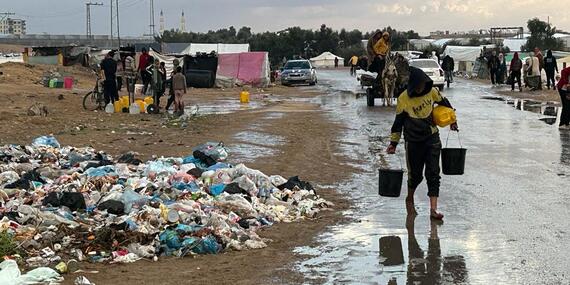Today's top news: Occupied Palestinian Territory, Ukraine

Occupied Palestinian Territory
The Under-Secretary-General for Humanitarian Affairs, Martin Griffiths, said he is appalled that a Médecins Sans Frontières (MSF) shelter was shelled last night, injuring staff and killing members of their family.
According to MSF, six people were wounded, with two relatives of staff killed, during an operation by Israeli forces in Al Mawasi, Khan Younis.
In a social media post, Mr. Griffiths said humanitarians are putting their lives on the line – and like all civilians, they must be protected.
The World Health Organization (WHO) said they assisted in the medical assessment of those injured, who were transferred to a hospital in Rafah, in coordination with OCHA and the Palestine Red Crescent Society. WHO said two of the six people wounded were children with burns.
Yesterday, OCHA and WHO worked with PRCS ambulances to evacuate 21 injured patients from Nasser Hospital in Khan Younis to two field hospitals in Rafah. Thirty-two patients in critical condition had been evacuated from Nasser Hospital on Sunday and Monday.
Our humanitarian partners working on water, sanitation and health issues in Gaza warned yesterday that urgent action is needed to address the public health catastrophe unfolding in the Gaza Strip. Most people have no access to clean water, with only one of three water pipelines from Israel still operating, and at less than half of its normal capacity. About 83 per cent of groundwater wells are out of service, and none of Gaza’s wastewater treatment plants are functioning.
Despite repeated warnings from the UN and our partners about the catastrophic effects of contaminated water and poor sanitation, major challenges continue to hamper the humanitarian response in Gaza, including import constraints, restrictions on movement, and lack of safety for aid operations.
As infectious diseases continue to spread, it is critical that water, sanitation and health services can be scaled up – but to do so, we need a removal of impediments to the entry and distribution of aid in Gaza, including fuel, as well as the free and safe movement of medical and humanitarian personnel.
And just a quick update on the work of Sigrid Kaag, the Senior Humanitarian and Reconstruction Coordinator for Gaza. She was in Jerusalem today to follow up on a number of pressing issues related to the situation in Gaza. She had meetings with Israeli officials.
Ukraine
Attacks in the Donetsk Region yesterday damaged a water filtering station in Kramatorsk City, disrupting the supply of clean water. The city, which had a pre-war population of 220,000 people, is now home to 90,000 people.
The attacks also caused more than 20 civilian casualties and damage to civilian infrastructure on both sides of the front line in the Donetsk Region, according to the Ukrainian Government and the Russian-installed authorities.
On the humanitarian response, aid organizations immediately delivered assistance, including emergency repair materials, to communities on the Ukraine side of the front line.
Also in the Donetsk Region, humanitarian partners provided aid to the front-line town of Kurakhove, which has been impacted by ten years of hostilities. The aid consisted of 13 tons of medical and hygiene supplies, including for people with disabilities, and solar lamps to support civilians whose access to basic services is severely disrupted.
